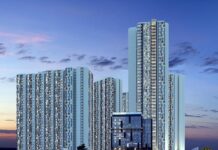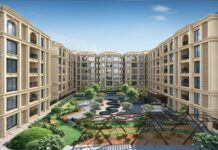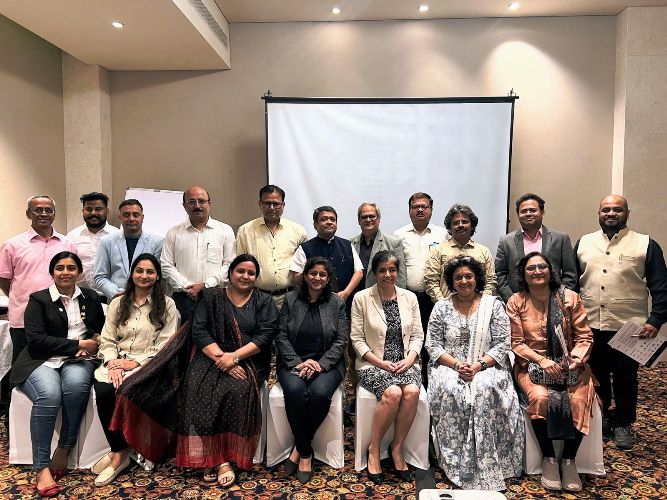Pune, December 30, 2023 : Pune, the cultural capital of Maharashtra, stands at the forefront of India’s urbanisation narrative, experiencing exponential growth in population, economy, and real estate. Pune’s urban landscape has evolved dramatically, fueled by the IT sector’s dynamism, a robust manufacturing base, and a thriving start-up ecosystem. The burgeoning demand for housing, especially apartments for sale in Pune, has propelled the city’s real estate sector to record growth, making it one of India’s most sought-after places to live.
In the April-June quarter of 2023 alone, Pune recorded the highest growth in housing sales (65%) among the top seven cities in the country compared to the same period last year. Even amidst economic uncertainties, the market’s resilience is underscored by affordable housing initiatives and the burgeoning trend of co-living spaces, diversifying Pune’s real estate milieu.
However, this growth begets challenges. Prudent land use planning, infrastructure augmentation, and environmental considerations necessitate meticulous attention to ensure sustainable development. Moreover, the construction sector’s significant contribution to carbon emissions via energy-intensive processes and material utilisation underscores the urgency of addressing growing environmental concerns in the region.
Recognising the imperative for decarbonisation within the construction sector, The Decarbonisation Business Charter (DBC) stepped in Pune, uniting key stakeholders towards mainstreaming net-zero buildings and construction practices. DBC is a collaborative initiative by the Alliance for an Energy-Efficient Economy (AEEE), Mahindra Lifespace Developers Limited, EcoCollab, and World Resources Institute India (WRI India). With more than 65 signatories onboard from the sector across India committing to reduce emissions in their upcoming projects, DBC aims to address shared challenges and foster decarbonisation strategies and actions for stakeholders across the value chain.
Pimpri Chinchwad Centre of the Indian Institute of Architect’s Maharashtra Chapter (IIA), collaborated with the Decarbonisation Business Charter to catalyse the awareness and capacity building of the local ecosystem and provide insights into the crucial need for decarbonisation and its broader implications for the city and facilitate collective identification of actionable points, existing gaps and challenges in the sector. The event brought together diverse stakeholders, including architects, sustainability consultants, developers, and government officials from the city, sharing knowledge on interventions and strategies for decarbonisation, laying the foundation for a collaborative and informed approach to decarbonising in the region, contributing towards the nation’s net-zero pathway.
Ar Paras Netragaonkar, Chairman, IIA Pimpri Chinchwad Centre, reminded all of the sustainability and harmony with nature inherent in the vernacular architecture of India. He expressed concern about the contemporary loss of sensitivity towards design that coexists with nature and responds to the climate. He remarked, “As we engage in extensive discussions about the decarbonisation of the sector today, it appears to be a rediscovery of principles that were once ingrained in the past, akin to reinventing the wheel.”
Poorva Keskar, Director, VKe Environmental, highlighted, “Cities are considered to be the carbon emission hotspots and contribute towards almost 70% of manmade fossil fuel Co2 emissions. The construction sector accounts for 65% of these emissions. The Pune Metropolitan Region (PMR) is spread over 6,914.26 sq. km. area and comprising 814 villages is predicted to grow at a steady growth rate of 28%. If the target of achieving Net Zero by 2070 is to be achieved, the construction sector in the PMR will have to adopt decarbonisation strategies not only for the new building stock but also to work towards retrofitting existing buildings. Adoption of Green Building Certifications, Energy Conservation Building Codes 2017 for commercial projects and Eco Niwas Samhita 2018 for new residential projects will result in almost 45% to 60% reduction of operational carbon of the building projects. It is predicted that the use of Green materials and improvement in current construction practices can accrue embodied carbon savings of an average of 20 %. The use of advanced and innovative materials with low embodied energy can reduce the embodied carbon to almost 40%. The CO2 captured in the materials gets locked into the project for 50 years till the end of the life of the building. However, the supply chain for building materials with low embodied energy is not yet mature and efforts will have to be taken to strengthen the ecosystem for easy uptake of the green materials. “
Dr Bhaskar Natarajan, Senior Fellow, AEEE, underscored the need for the developers, design consultants and architects to come together and explore solutions to address the pressing need for carbon reduction in the construction and occupation phases of buildings. He emphasised, “Prioritising alternative materials and integrating passive design solutions are crucial steps, and it is equally vital to educate consumers about the low carbon options available in these structures. I urge all stakeholders to participate in the Decarbonisation Business Charter actively, working together to achieve net-zero emissions by 2070.”
Pramod Kumar Singh, Senior Director – Research and Programmes, AEEE, stressed, “Embracing sustainability and net-zero practices positions developers as responsible and forward-thinking contributors to a more sustainable future. This also yields benefits in terms of incentives from the governments and municipalities, making it economically attractive for developers. Several banks have green financing products that provide concessional finance to such developers and projects. Moreover, customers are increasingly becoming environmentally conscious and acknowledging the associated benefits of health and well-being, resulting in the price and the rental premium. India has energy building codes, and the government plans to develop sustainable building codes. In the future, we are likely to see stringent compliance requirements. Committing to sustainability ensures compliance with current and future regulations, avoiding potential legal complications. Furthermore, it enhances a developer’s brand image and reputation, fostering goodwill among various stakeholders. This could be a big differentiator for developers in a competitive market. Sustainability will not remain an optional good-to-do practice but will become the ethical and the legal way of doing business in the near future.”
The event was attended and facilitated by leading sectoral experts and esteemed dignitaries from the region including Makarand Nikam, City Engineer, PCMC; Sanjay Kulkarni, Joint City Engineer (Environment), PCMC; Pratima Washan, Asia ESG & Sustainability Practice Lead, AECOM, Dr. Poorva Keskar, Director, Vke Environmental; Kanagaraj Ganesan, Founder, Integrative Design Solutions and Roopa Nair, Director and Integrator, Integrative Design Solutions.
Corporate Comm India (CCI Newswire)



















